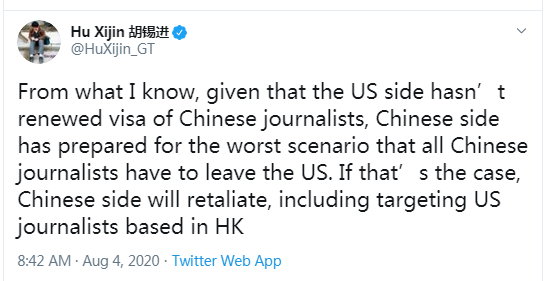China's Foreign Ministry said on Tuesday that China will retaliate if the U.S. continues escalating political suppression of Chinese media in the country.
"We urge the U.S. to stop political suppression of Chinese media and reporters or China will be forced to take necessary and proper actions to safeguard its legitimate interest," Ministry Spokesperson Wang Wenbin said at a regular press briefing in response to a report that China would retaliate if the U.S. continues bullying Chinese journalists.

Global Times Editor-in-Chief Hu Xijin's twitter screenshot. /CGTN
Global Times Editor-in-Chief Hu Xijin's twitter screenshot. /CGTN
Wang said the ministry knows that no Chinese journalist in the U.S. have had their application for visa renewal approved so far, and their visas are due to expire on August 6.
In May, the U.S. significantly shortened Chinese journalists' visas to 90 days with an option for an extension.
The spokesperson noted that the U.S. has been so entrenched in a Cold War mentality and ideological bias that it has been escalating its actions against Chinese media.
In December 2018, the U.S. demanded Chinese media organizations with offices in the U.S. to register as "foreign agents," said Wang, adding that since 2018, the United States has denied visa applications for more than 20 U.S.-based Chinese journalists without cause.
In February 2020, the U.S. also designated five Chinese media organizations in the U.S. as "foreign missions" and then placed a cap on the number of their staff, in effect expelling 60 Chinese journalists, according to Wang.
He stressed that Chinese journalists stationed in other countries including the U.S. have been carrying out news reporting under the principle of objectivity, fairness, truthfulness and accuracy.
Because of mounting U.S. oppression, Chinese journalists' normal reporting activities, the reputation of the Chinese media and people-to-people exchanges between the two sides have been gravely damaged, Wang added.
"While priding itself on freedom of press, the U.S. now obstructs the Chinese media from doing their job. Such a two-faced behavior exposed its hypocrisy in so-called freedom of press, nothing short of double standards and hegemonic bullying," he also said.
Wang did not reveal how China will hit back over the visa dispute but defended the possibility that China might target U.S. journalists based in Hong Kong, saying it is the central government's diplomatic power as Hong Kong is a special administrative region of China.